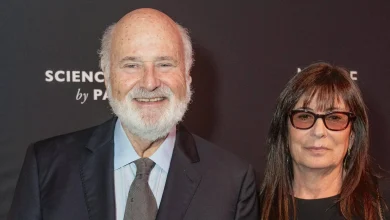Pluribus review — Vince Gilligan’s apocalyptic new sci-fi is thrillingly unpredictable

Unlock the Editor’s Digest for free
Roula Khalaf, Editor of the FT, selects her favourite stories in this weekly newsletter.
Vince Gilligan’s first show since the conjoined worlds of Breaking Bad and Better Call Saul is a philosophical head-scratcher that mischievously skips around various genres and moods. It is deliberately wriggly and slippery, which makes it a lot of fun.
But he sticks with at least two elements familiar from his previous two hit series. Pluribus’s primary location is Albuquerque, New Mexico, and it stars Rhea Seehorn from Better Call Saul, where she stood out as much-loved lawyer Kim Wexler. She takes the lead here and shoulders the vast bulk of the show as Carol Sturka, a cantankerous author of “speculative historical romance literature” who finds herself facing an apocalyptic event.
Its tagline is “the most miserable person on Earth must save the world from happiness”, which is a compact and slick snapshot of a series that is, in practice, far more resistant to tidy summary than that. It appears at first to be a sci-fi show, beginning as it does with a countdown to a potentially planet-shattering occurrence. An encrypted communication is being sent from somewhere else in the universe, and there are enough laboratory scenes to suggest that it’s all about to go a bit Contagion.
In the normal world, an oblivious Carol is on a book tour, giving readings of her latest florid novel, which even she describes as being “like a bad episode of Star Trek”. She has ardent followers and a devoted fan base, but looks down on them and spends an inordinate amount of time drowning her sorrows and bemoaning her lot as a popular novelist. Her partner Helen (Miriam Shor), who is also her manager, knows how to handle Carol’s dark moods — but, before long, that looming countdown reaches zero, and the world is turned into a place where romantasy novels are the last concern.
Carol is a misanthrope, though not an entirely convincing or hugely dedicated one. The fact that she becomes one of humanity’s last hopes complicates an already complicated situation, not least because the lines between right and wrong are unclear. Much like its Apple stablemate Severance, Pluribus will be minutely dissected, and its details pored over in depth. The philosophically inclined will have fun with its thought experiments, and its questions about what it means to be a human being. The techno-wary among us may see it as an AI parable, a way of asking what an automated world means for the people and animals inhabiting it.
If all of this sounds vague, blame Apple’s proscriptive list of forbidden plot details, but in truth Pluribus is best approached with as few spoilers as possible, to gain the most pleasure from its many unexpected turns and pivots. If an argument can be made that television has become increasingly formulaic in the streaming era, then this exhilaratingly hard-to-predict series is an outlier.
At times it is chilling and eerie, then it is thriller-ish and jumpy, then it is screwball and slapstick. It has a cerebral streak, yet wears its concept lightly. The first seven of nine episodes were made available for review and, on the basis of those episodes, it continues to evade expectations. Each episode is a surprise, and newly, oddly delightful.
★★★★★
First two episodes on Apple TV+ now. Further episodes weekly





